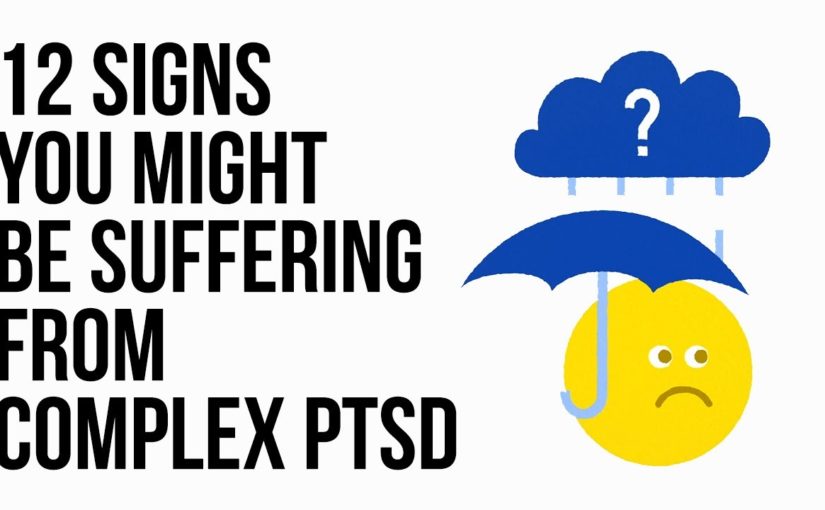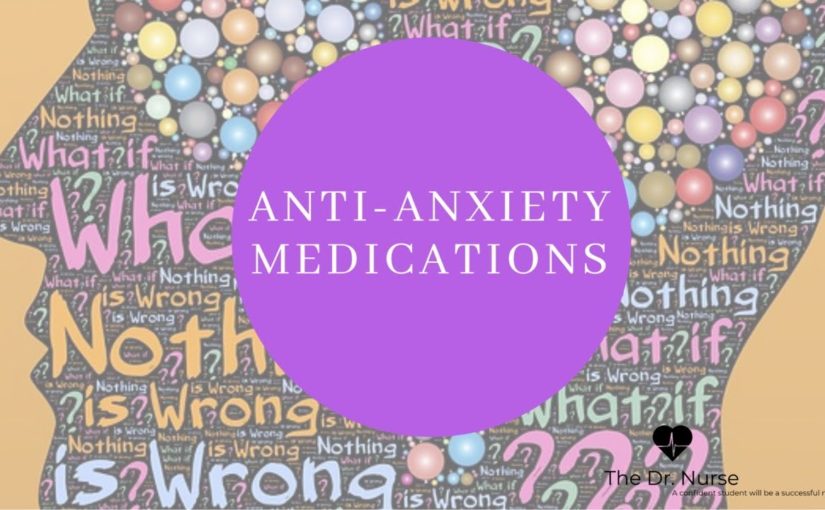Maybe you’ve heard the term “bipolar”
used to describe someone who’s moody, or who has mood swings, but this colloquial use
of the term is different from bipolar disorder. Bipolar disorder, which used to be called
manic depression, is a serious mental illness that causes a person to have dramatic shifts
in emotions, mood, and energy levels: moving from extreme lows to extreme highs. But these shifts don’t happen moment to
moment, they usually happen over several days or weeks. There are a few different types of bipolar
disorders, but there are some common features. First, the low moods are identical to those
in a related disorder – major depressive disorder, also known as unipolar depression. Individuals with this can feel hopeless and
discouraged, lack energy and mental focus, and can have physical symptoms like eating
and sleeping too much or too little. But along with these lows, the thing that
sets bipolar disorders apart from unipolar depression is that individuals can have periods
of high moods, which are called manic episodes or hypomanic episodes, depending on their
level of severity. In a manic state, people can feel energetic,
overly happy or optimistic, or even euphoric with really high self-esteem. And on the surface, these might seem like
very positive characteristics, but when an individual is in a full manic episode, these
symptoms can reach a dangerous extreme. A person experiencing mania might invest all
of their money in a risky business venture or behave recklessly. Individuals might talk pressured speech, where
they talk constantly at a rapid-fire pace, or they might have racing thoughts and might
feel ‘wired,’ as if they don’t need sleep. Manic episodes can also include delusions
of grandeur, for example,, they might believe that they are on a personal mission from god,
or that they have supernatural power. And they might make poor decisions without
any regard for later consequences. One way to understand these swings is by charting
them on a graph. So let’s say the y-axis is mood, with mania
and depression being on the far ends of the axis, and the x-axis is time. The average healthy individual might have
normal ups and downs throughout their life, and they might even have some pretty serious
lows once-in-awhile, maybe after losing a job or moving to a new place and feeling lonely. An individual with unipolar depression though
might have the normal highs, but they might have some crushing lows that last for a long
period and may not have an obvious trigger. Now, for the bipolar disorders, the first
one is called Bipolar 1, and these are people that have some major lows that last at least
2 weeks, and some major highs that last at least a week or require hospitalization. That said, untreated manic episodes can last
as long as 3-6 months. Depression is seen in most cases but is not
required for a diagnosis. The second one is called Bipolar-2, and this
is when a person experiences similar lows and has additional highs called “hypomania”,
which are less severe manic episodes than we see in Bipolar 1. To qualify for a diagnosis, these hypomanic
states need to last at least four days. Once again though, these symptoms generally
last a few weeks to a few months. Alright the third one is called cyclothymia,
or sometimes cyclothymic disorder, and these individuals have milder lows as well as the
milder highs or “hypomania” like you see in Bipolar-2, and they cycle back and forth
between these two over a period lasting at least 2 years.

Sometimes, people with Bipolar disorder can
show other, less common symptoms as well, for example having what is referred to as
mixed episodes—experiencing symptoms of both depression and mania at the same time. Another symptom they might have is rapid cycling,
which describes a situation where a person has 4 or more episodes of depression or mania
within a given year. Like most mental health conditions, the exact
the underlying cause of the bipolar disorder isn’t known, and there is no single “bipolar gene”
identified, but it’s thought that there are genetic and environmental factors that
play a part. For example, one interesting clue is that
people with family members who have bipolar disorder are 10 times more likely to have
it themselves. Another clue is that some drugs and medications
can trigger manic episodes, like selective serotonin reuptake inhibitors (or SSRIs). It’s also worth mentioning that people with
bipolar disorder often have other disorders like anxiety disorders, substance use disorders,
ADHD, and personality disorders as well, making diagnosis and treatment a real challenge. Even though there’s no cure for bipolar
disorder, identifying and treating individuals is important, since there’s a real
danger that the person could harm themselves or commit suicide. One of the oldest treatments is also one of
the most effective treatments, and that’s lithium salts. Lithium acts as a mood stabilizer—smoothing
out the highs and lows they experience. That said, it is much better at treating manic
rather than depressive episodes, and so individuals who take it often have to take other medications
as well, which can be problematic since some antidepressants (like the SSRIs) can trigger
manic episodes in individuals who are predisposed to them. Other treatment options include antipsychotics,
anticonvulsants, and benzodiazepines, but many of these—including lithium—have side
effects that can be severe and lead to non-adherence which can be dangerous for an individual. Now, unlike certain disorders like unipolar
depression, psychological interventions, like talk therapy, or cognitive-behavioral therapy
are not particularly effective in treating the manic episodes of bipolar disorder. Having said that, they can still be very helpful
tools to help individuals with bipolar disorder in general—especially after a manic episode
has ended. They can also help an individual handle stressful
situations that might otherwise lead to a manic episode, thereby helping to prevent a potential
manic episode in the first place. Alright, so super fast recap: bipolar disorder
is a mental disorder characterized by depression, periods of lowered mood, as well as mania,
and periods of heightened mood. Thanks for watching, you can help support
us by donating on Patreon, subscribing to our channel, or telling your friends about
us on social media.
As found on YouTubeFUNNELIFY is a new, first-of-its-kind, groundbreaking app ➯➱ ➫ ➪➬ which finally allows you to deliver separately auto-generated mobile pages with unheard before lighting speed. Plus it skyrockets ➯➱ ➫ ➪➬ After using the Funnelify product, you will recognize a great increase in your leads and sales. This product shows methods to boost your traffic without using any shortcuts. The best thing is that you can build unlimited … As found on YouTubeAlzheimer’s Dementia Brain Health ➫➬ ꆛシ➫ I was losing my memory, focus – and my mind! And then… I got it all back again. Case study: Brian Thompson There’s nothing more terrifying than watching your brain health fail. You can feel it… but you can’t stop it.
As found on YouTubeAlzheimer’s Dementia Brain Health ➫➬ ꆛシ➫ I was losing my memory, focus – and my mind! And then… I got it all back again. Case study: Brian Thompson There’s nothing more terrifying than watching your brain health fail. You can feel it… but you can’t stop it. As found on YouTubeAlzheimer’s Dementia Brain Health ➫➬ ꆛシ➫ I was losing my memory, focus – and my mind! And then… I got it all back again. Case study: Brian Thompson There’s nothing more terrifying than watching your brain health fail. You can feel it… but you can’t stop it.
As found on YouTubeAlzheimer’s Dementia Brain Health ➫➬ ꆛシ➫ I was losing my memory, focus – and my mind! And then… I got it all back again. Case study: Brian Thompson There’s nothing more terrifying than watching your brain health fail. You can feel it… but you can’t stop it.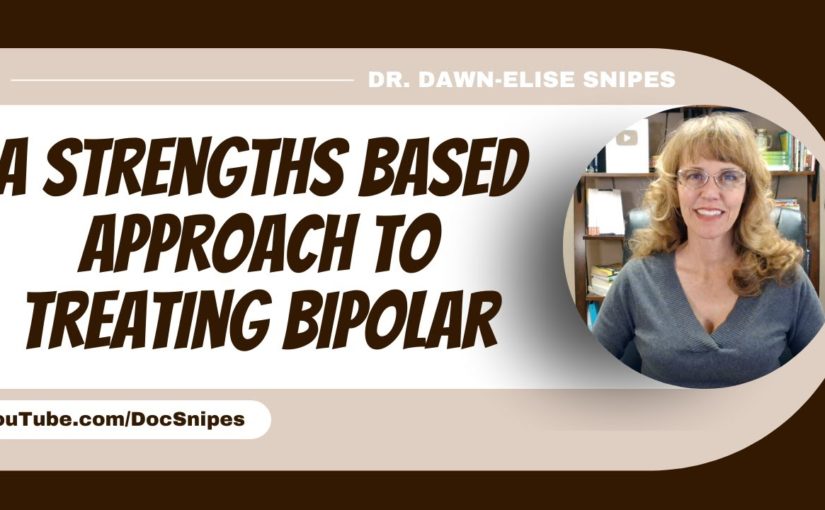
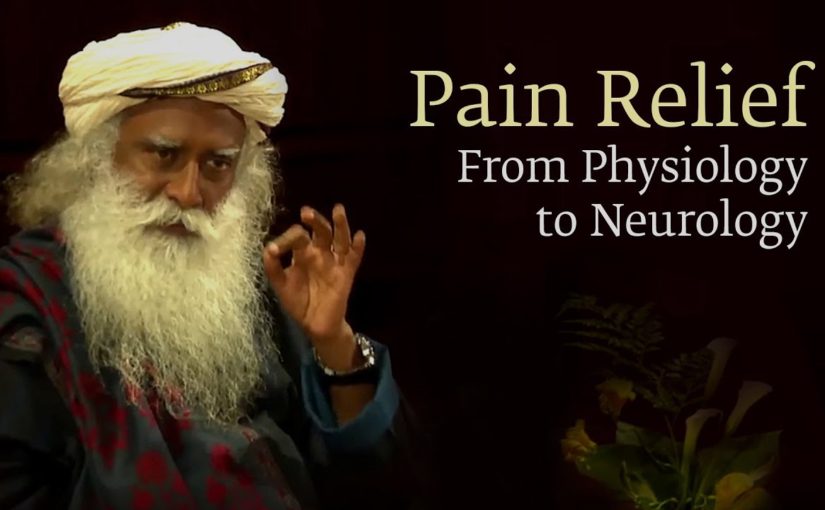
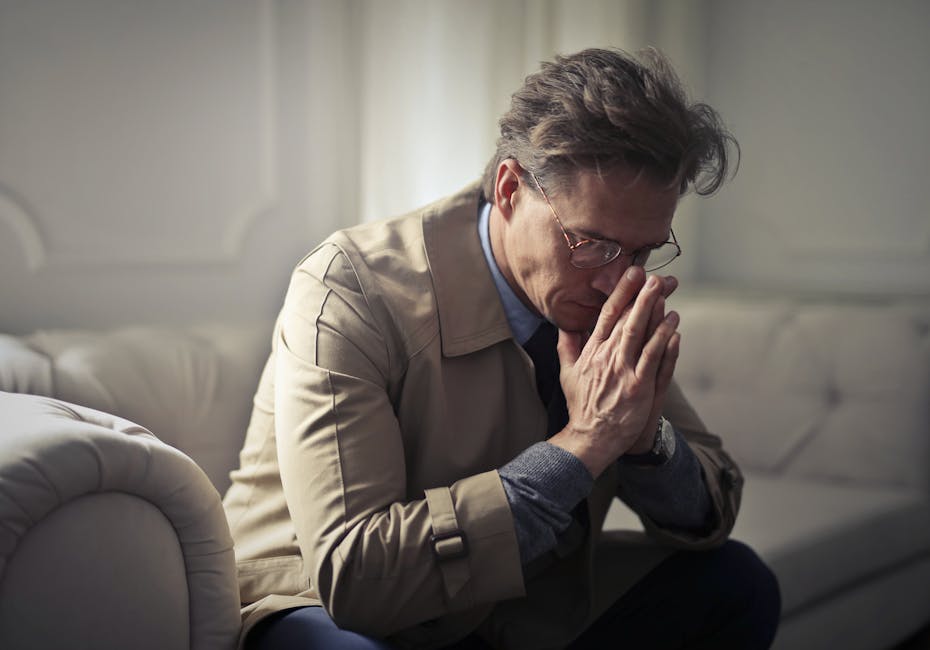
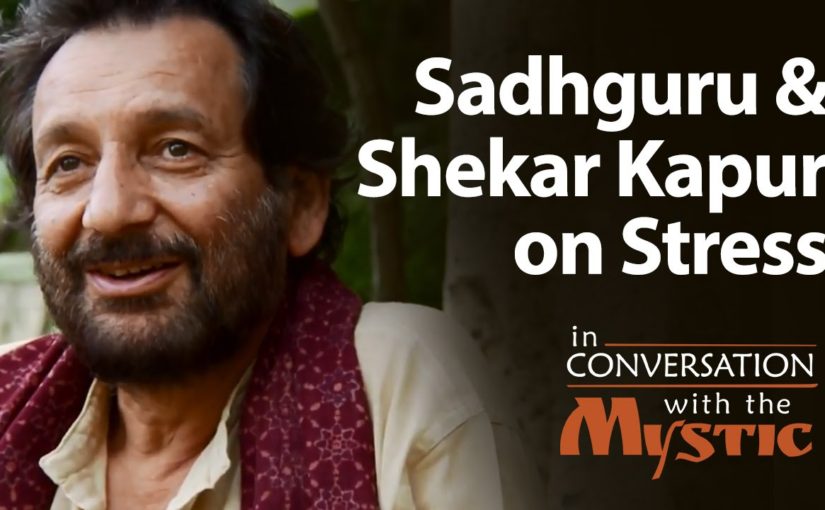
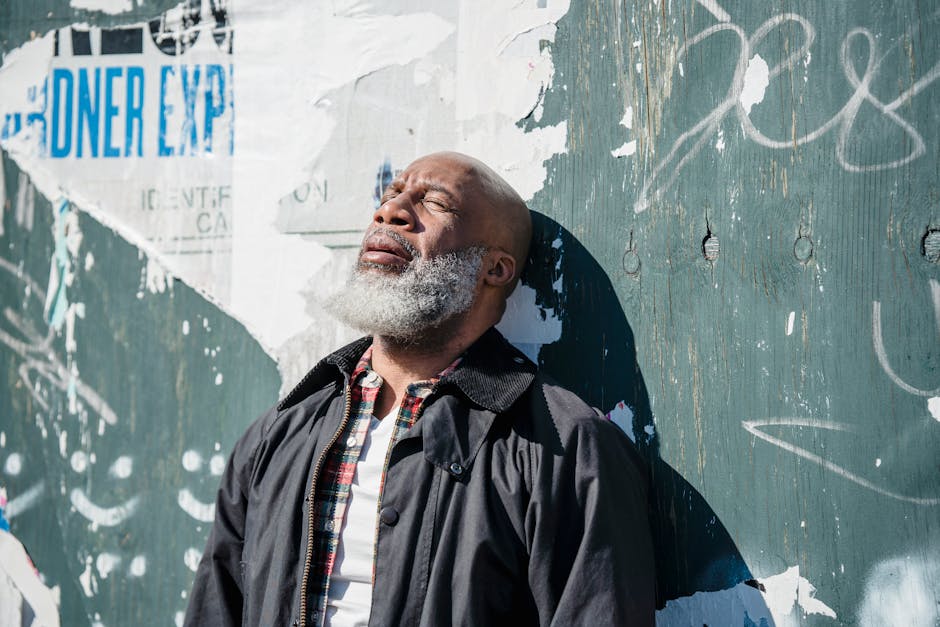 He also goes to the toilet. He also brushes his teeth. He also does the same things. But somehow his life is magical and beautiful because of the context. This could have happened to people when they fall in love with somebody. They were doing the same thing, suddenly they are in love with someone, and suddenly everything is different because the context of their life has changed. But then once they fall out of it, again (Laughs) the context of their life changes and it becomes miserable. Now, changing the context is voluntary, which is just something that you can do willfully. Changing the content may not be possible as you will. Because to change the content of your life, you need permission from the situations in which you exist, isn’t it? Shekhar Kapur: Yeah. Sadhguru: But to change the context of life, you don’t need anybody’s permission. You… it is not at all situational. So on a certain day, three men were working in one place. another man came by and asked the first man, “What are you doing here?” This man looked up and said, “Can’t you see I’m cutting stone? Are you blind?” This man moved on to the next man and asked, “What are you doing here?” That man looked up and said, “Something… something to fill my belly. I come here and do whatever they ask me to do. I just have to fill my belly, that’s all.” He went to the next man, the third man, and asked, “What are you doing here?” That man stood up in great joy and said, “I’m building a beautiful temple here!” All of them are doing the same thing, but their experience of what they’re doing is worlds apart. Every human being, every moment of his life could be doing whatever he is doing in any one of these three contexts and that’ll determine the quality of his life, not what he is doing. How simple an activity you’re doing or how complex an activity you’re doing doesn’t change the quality of your life. In what context are you doing, changes the quality of your life, isn’t it? Shekhar Kapur: Completely.
He also goes to the toilet. He also brushes his teeth. He also does the same things. But somehow his life is magical and beautiful because of the context. This could have happened to people when they fall in love with somebody. They were doing the same thing, suddenly they are in love with someone, and suddenly everything is different because the context of their life has changed. But then once they fall out of it, again (Laughs) the context of their life changes and it becomes miserable. Now, changing the context is voluntary, which is just something that you can do willfully. Changing the content may not be possible as you will. Because to change the content of your life, you need permission from the situations in which you exist, isn’t it? Shekhar Kapur: Yeah. Sadhguru: But to change the context of life, you don’t need anybody’s permission. You… it is not at all situational. So on a certain day, three men were working in one place. another man came by and asked the first man, “What are you doing here?” This man looked up and said, “Can’t you see I’m cutting stone? Are you blind?” This man moved on to the next man and asked, “What are you doing here?” That man looked up and said, “Something… something to fill my belly. I come here and do whatever they ask me to do. I just have to fill my belly, that’s all.” He went to the next man, the third man, and asked, “What are you doing here?” That man stood up in great joy and said, “I’m building a beautiful temple here!” All of them are doing the same thing, but their experience of what they’re doing is worlds apart. Every human being, every moment of his life could be doing whatever he is doing in any one of these three contexts and that’ll determine the quality of his life, not what he is doing. How simple an activity you’re doing or how complex an activity you’re doing doesn’t change the quality of your life. In what context are you doing, changes the quality of your life, isn’t it? Shekhar Kapur: Completely.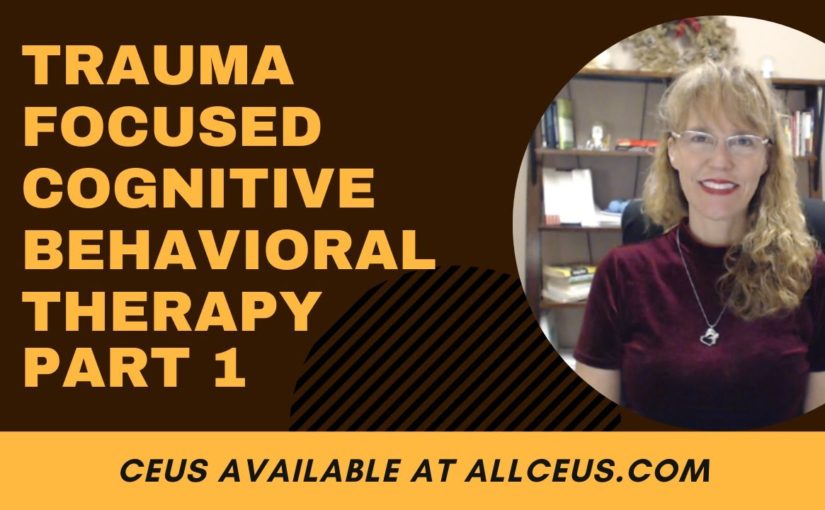
 Etc sometimes you need to
delay joint sessions until the parent or caregiver can offer the child support and sometimes that
means not even starting treatment really until the parent and caregiver parent or caregiver
can be on board now you can get started with psychoeducation emotions identification feelings
identification and stress management and coping skills you know there were not really
poking a bunch of bears so you can probably safely get started on that if it’s sometimes it’s
court-ordered and they have to start treatment by April 1st or something so there are things you can
do but you may need to delay the actual beginning of the trauma narrative until the parent is
able to be available to educate everybody on how therapy works and instill in everyone not just
the parent optima optimist that well optimism about the child’s potential for recovery you
know sometimes they’ve been dealing with this child’s acting out behaviors for so long they’re
just like you know we’ve already been to three other therapists I don’t know what’s going to
fix it or I’ve done everything I know how to do good luck so we can talk about you know a
different approach or we can talk about what they’ve done that’s worked for a short period
of time and build on those strengths to instill optimism and hope and empowerment so
initially, when we talk about psycho-education it’s important to provide accurate information
about the trauma when children are traumatized they can be confused and not completely understand
what happened they may blame themselves and they may hold on to myths because they’ve been misled
and/or deliberately given incorrect information so one of the best ways we can help is to correct
that information provides information about how often this happens and whether you know it’s okay
to do this that or the other psychoeducation clarifies inappropriate information children may
have obtained directly from the perpetrator or on their own so the perpetrator may have told them
that this is how I express love or this is how you need to be disciplined because you don’t learn
this is how I was disciplined whatever it is or they could have gotten it on their own they could
have gotten it from school from the internet or just come up with it in their little heads trying
to make sense of what happened psychoeducation also helps them identify safety issues the
difference between safe situations and dangerous situations and as we get through this I really
want you to get away from the notion that TF CBT and childhood trauma are only physical and sexual
abuse there are so many other traumas as evidenced by the adverse childhood experiences survey that
I want you to wrap your head around that and there are things they didn’t cover in the aces such as
bullying and natural disasters so we want to help children whatever the trauma is the trauma made
they feel unsafe so we want to identify safety issues if the trauma was a hurricane then we want
to talk about what hurricanes are how often they hit what to safety plan etc so every time a
the thunderstorm comes they don’t freak out and we want to use psychoeducation to provide another
way to target faulty or maladaptive beliefs by helping to normalize thoughts and feelings about
the traumatic experience you know it makes sense that that was scary and makes sense that
you’re angry it makes sense that you feel this way and we can talk about why that makes
sense and why it makes you feel that way through cycle education you’re getting the child to start
talking about the specific trauma that he or she experienced in a less anxiety-provoking way by
talking in Jen wrong about the type of trauma so you’re talking about natural disasters you’re
talking about plane crashes you’re talking about domestic violence so they start learning about
it and then eventually you’re going to move down to their experience with it so like I said there
are a ton of different traumas and the ACE study even acknowledges that these are just the ten most
common ones that they heard however there are many many many different traumas and types of trauma
some of the biggest ones are physical and sexual abuse physical neglect emotional abuse
and neglect and the Aces identified mother treated violently I would say anyone in the household
treated violently it’s not just the mother’s substance misuse within the household and that
can be by the parents or by siblings household mental illness parental separation or divorce and
an incarcerated household member so those were aces but then like I said there’s also bullying
the death of a parent or sibling is extremely traumatic hurricane tornado natural disaster and
then I put the fire out separately because sometimes fire can be man-made sometimes it can be a wiring
problem but sometimes it can be Jr was playing with matches now even if jr. Accidentally started
the fire does that make it any less traumatic no it probably makes it more traumatic because then
there’s a whole sense of guilt and responsibility but it’s still a trauma that has to be dealt
with so I put a link to the adverse childhood experiences website if you want to go look more
about that but we’re going to move on psycho-education involves specific information about
the traumatic events the child has experienced not the child’s event we’re not going to go
into police records or something, we’re just going to talk about specific information about
domestic violence or whatever body awareness and sex education in cases of physical or sexual
maltreatment and there are caveats for getting parental consent and permission and all that other
stuff and Risk Reduction skills to decrease the risk of future traumatization now going back to
those other things it’s not just about physical or sexual abuse so we want to look at what was the
the risk created by you know how can you reduce your risk of being bullied how can you reduce your
risk of being traumatized in a tornado you know you can’t stop the tornado from coming
and they’re everywhere so what do you do and talk about a safety plan the same thing with fire
information needs to be tailored to fit a child’s particularly particular experiences and level
of knowledge obviously, you’re going to provide different information to a seven-year-old than
you are to a 17-year-old provide caregivers with handout materials to reinforce the information
discussed in session so this may help educate the parents about some of it but it lets them
know what you talked about and it gets us all on the literal same page you’re providing them a
handout of everything you went over with Junior and we want to encourage caregivers to discuss
this information at home reinforces accurate information about how safe or unsafe they
are and obviously, we’re going towards safe and reinforced accurate information and develop
a safety plan so they feel confident that at home they’re going to be taken care of when you
start psychoeducation you do want to get a sense of what the child already knows and you can use
a question-and-answer game format in which the child gets points for answering questions which I
love this suggestion so you can ask them if you know what is a hurricane or is a tornado and see
if they know and see if they know how much time and much-advanced warning we have for a tornado
versus a hurricane or you know whatever situation you’re talking about you see I did a lot of posts
Hurricane Katrina counseling in northern Florida so that’s one of those things that comes up for
I am talking with children about how likely is it that a category 5 hurricane is going to hit
again but encouraging them to give your aunt’s give answers and if they give the wrong answer you
know it’s great to try now you know try to coach them into a correct answer or provide them the correct
one but give them credit for at least making an effort sample questions might include what is
you know and put in the type of trauma what is bullying how often do you think bullying happens
and why does bullying happen you know those are some questions you can ask to just open a dialogue
about bullying, if this child has been a victim of bullying and is and is traumatized so cultural
considerations meet the child and family where they are by presenting information in a way which
they can relate it to their belief system and you may need to consult with their spiritual
guidance guides leaders whether it be a pastor or you know whatever to get some guidance
on how to handle certain aspects of whether it was the will of God and in the case of sexual abuse
how to handle the concept of virginity and how to handle the concept of bad things happening to bad
people and whatever else they think is coming from or their parents are instilling in them in a
belief system we want to make sure that we’re not necessarily contradicting it and going oh mom dad
and the church is wrong but we also want to help them try to integrate this in a way that can help
they have strong self-esteem so reaching out to those spiritual leaders and the family asking what
their belief system about certain things can be very helpful assess the general beliefs about
the trauma if something happened or when something happens ask the parent or the family that’s there
not necessarily the child but you want to get a sense of what the family stance is on why this
happened what it means how it’s going to impact life hence foreign henceforth and forever more
focus on the events they perceive as traumatic to the family but most especially the child if the
child’s going back to the Aces you know maybe the parents got divorced but the child doesn’t
see that as traumatic because there was domestic violence ahead of time the domestic violence was
traumatic the divorce was a relief so wherever the child is with each trauma we want to
be respectful of what they perceive is traumatic and tailor the information so the family can be
more receptive to it as supportive as possible and sometimes you need to make sure that the language
you know make sure the language is not jargony about general views of mental health and mental health
treatment should also be assessed and addressed in the psychoeducation piece not only with the child
but also with the family, if they are suspicious of it don’t understand it think that you’re just
going to magically fix Junior we want to demystify the process and talk about what is the purpose of
the assessment what is the purpose of each one of these activities and why am I doing this or why
are we doing this as a team and how can it help and then we also want to provide information to
D stigmatize and normalize mental health issues and seeking treatment some cultures are still
resistant to seeking treatment and I use the term cultures broadly because there’s
a stigma associated with it so normalizing for them how many people go to treatment how common
PTSD is or whatever the situation you’re dealing with it doesn’t mean they have to like it but at
At least it will give them a little bit of a nugget to understand that they’re not the only ones if
they are from a cultural group a minority cultural group of some sort you might want to provide
information about how common this particular issue is in their group I’ve done a lot of work
with law enforcement and emergency responders and they’re kind of their little group so
we talk about how common depression is among law enforcement and emergent emergency responders
specifically, because they face so much so many different stressors than you know Joe Schmo over
here so it D stigmatizes and normalizes a little bit now they still may not talk about it and
go well hey you know 37% of us have clinical depression no that’s probably not going to happen
but at least in the back of their mind, they can go you know what I’m looking around this room and
I can bet that at least one other person’s on antidepressants or something and feel a little
less unique and isolated in parent sessions you want to provide a rationale and overview of the
treatment model educates parents about the trauma and talks about the child’s trauma-related symptoms
so we’re going to go over what is hyper-vigilance what is the function it why people become
hypervigilant after trauma and what might it look like in a child because it presents very
differently for different children so we might want to give some ideas and say does this sound
like Johnny or does this sound like Johnny and help them understand why these behaviors may
be coming out we want to talk about how early treatment helps prevent long-term problems okay
maybe the trauma happened three years ago but still, it’s better than waiting ten more years and
you know Johnny’s still not having any Ellucian will want to talk about the importance of talking
directly about the trauma to help the children cope with their experiences and not hedging and
this will be on a case-by-case basis but the manual walks you through handling this discussion with
the parents about exactly how much detail do I go into if Johnny brings it up at home reassure
parents that children will first be taught skills to help them cope with their discomfort
and that talking about the trauma will be done slowly with a great deal of support so we’re not
just going to plop them down and go okay and tell me about the day that all this happened which
is what the child has experienced already if it was reported to law enforcement and/or the child
welfare they’ve probably had somebody sit down and say get right to the nitty-gritty at least
once or twice and it’s completely dehumanizing so we want to reassure parents that we’re not
going to do that to the child again will help the caregiver understand their role in the child’s
treatment since this modified since this model emphasizes working together as a team so I’m not
just going to be educating you it’s not going to be a parallel thing where I go in and I work with
Johnny and then I tell you what I did and then I work with Johnny I’m going to work with Johnny
and then we’re going to discuss what Johnny and I did in session and I’m going to get input from
you and we’re going to talk about how you feel about it and then I’m going to provide you with tools
so you can help Johnny outside of the session because you’re going to be with them for six-and-a-half
other days that I’m not and this can’t work if it’s just one hour once a week and we want to
elicit parent input questions and suggestions as much as possible because they’ve been living with
their kid for you know however many years so they probably have an idea about what works and what
doesn’t so we’ll start with both parents and children in their respective sessions helping
them understand what control breathing is and how it helps slow the heart rate and trigger the
wrist and digest sort of reaction in your body when your breathing slows your heart naturally
slows because the stress reaction tells your brain you’ve got to breathe fast and the heart
rates got to go fast well when you override that then you’re kind of overriding the whole system
and we’ll also talk about thought stopping and this is especially helpful if the trauma is recent
or and/or ever-present in the mind of the youth so they can say I am NOT going to talk about that right
now I’m not going to think about that right talk about distraction techniques go back to
your DBT stuff talks about improving the moment and accepts to help the child develop skills to
handle and work through when those thoughts pop up replace unthawed unwanted thoughts with
a pleasant one so talk about it in session when thoughts like that come up what would you
prefer to think about and then really get into the Nitty Gritty the five senses what do you see
smell hear taste you know help me get into that situation or that thought this teaches that
thoughts even unexpected and intrusive ones can be controlled so that gives them hope and again we’re
not exacerbating the thoughts right now we’re not bringing up their particular trauma and
having them get into detail we are just helping them deal with what’s happening normally on a
day-to-day basis so they feel like they have more control for the older kids you can have them
people log about when this technique is used what they were thinking about and how effective the
thought stopping was and then review it and help them tune it up if it’s not really effective and
give them praise for when they use it effectively relaxation training persons of Asian or Hispanic
origin tend to express stress in more somatic or physical terms so just be aware of that but that
doesn’t mean that Caucasians don’t relaxation training is good for anyone and the medical
school of South Carolina training recommended that relaxation is stress-free and
workbook by Davis Schulman and McKay so and it is still in publication when deciding how to
present relaxation techniques are creative have the child help you to integrate the elements
into the technique that makes it more relevant to them so, what are you thinking about when you
relax you know I know I like to go to the woods but maybe this kid likes to think about a video
game or play with their dog whatever it is but helps them make it relevant to them and then have
they identify other things they do to relax like drawing listening to music walking and making a
list of those things so they can refer to it when you’re teaching relaxation training especially if
you’re doing something like progressive muscular relaxation be sensitive to the child’s wishes if
they don’t wish to close their eyes or lie down which could trigger memories of the trauma we’re
not going there yet so if they feel vulnerable lying down or taking orders like that because
you can imagine how being told to lie down and close their eyes might be a trigger for certain
abuse survivors you know be cognizant of that and say you know get into a comfortable position
or how where would you like to sit while we talk about this like I said parents can often
benefit from the relaxation training as well so because they’re dealing with their issues
about the trauma but they’re also dealing with trying to figure out how to help Johnny and any
of them deal with any of Johnny’s misbehaviors or problematic behaviors then they move on to
feelings identification so it helps the therapist judge the child’s ability to articulate feelings
if you can tell me what makes you happy that’s great but if you can’t then you know we need to
work on figuring out what makes you happy you also want to help the child rate the intensity
of the emotion don’t let them stick with happy mad sad glad and afraid you know let’s talk about
different emotions and use the emotion chart with little faces on it or you can use the emotion
thermometer so is it a hot emotion or is it a cool emotion and helps the child
learn how to express feelings appropriately in different situations I mean sometimes they’re
going to be angry but it might not be appropriate to you know get up and stomp out of the room or
whatever however they communicate it so help them figure out how to articulate that so they can be
heard and supported some children have difficulty discussing or identifying their feelings so
you might try stepping back and discussing the feelings of other children or characters from
books or stories so you know think about Puff the Magic Dragon if they’ve read that you know
that dates me a little bit there but you know how did the little boy feel and talking about things
different characters and different stories where there are elements of anger and shame and loss and
all of that stuff helps children identify how they experience emotions if they seem detached
from the experience because sometimes they just they’ve shut it off it was just too overwhelming
so we want to talk about you know when you’re happy what does that feel like or when you’re
angry what happens what does your body feel like when you’re angry and they might be able
to tell you they hear their heartbeat in their ears or everything gets all fuzzy or whatever
but help them start tuning in to how they react and connecting that with an emotional word and then
after all, that’s done they can identify feelings they can identify feeling intensity now we want to
differentiate between thoughts and feelings many children describe thoughts when they’ve been
asked about a feeling so if you ask them how they feel they may say I want to run away so
you want to say okay well I hear that you want to run away so I’m wondering if you are bored and you
you’re bored and want to get away from it or if you’re scared can you tell me a little bit more
about what it means to you to want to run away during feelings identification the parent
sessions normalize what is going on with their child and help the parent understand that some
children may be seemingly in constant distress or detached from the trauma and that’s okay
we all react differently to traumas so again we’re going to share with the parents what we’re
Do let them know any specific difficulties if any juniors have encouraged the parent to praise
the child for appropriate management of difficult motions and I put in parenthesis successive
approximations because they’re not going to get it a hundred percent right every time so if they
try to effectively manage their emotions even a little bit let’s give them praise for that and
then help them figure out how to do it a little bit better the next time so instead of having a
complete meltdown maybe they got up and stomped out of the room well that’s an improvement so
then we want to talk about how to shape that behavior so it’s a more appropriate communication
if parents have difficulty identifying their own emotions provide them with examples so
continually ask them questions about how you feel when it’s a rainy day outside and how to do you
feel when somebody’s supposed to call you and they don’t how do you feel when and have about 15 or 20
examples and you can have them on a piece of paper and even give it to the parent to take home for
their homework if parents are overcome with their own emotions about the trauma validate
their feelings and explain how children need to see that their parents can handle talking
about the trauma so there the children need to see the strength and the parents which is what you’re
going to work on in parent sessions to make sure that the parents have the resolve and the skills
handle talking about this topic with junior TFC BT can be an effective intervention
for children or adolescents whose primary presenting issue is trauma-related emotional or
behavioral dysregulation TF CBT is not appropriate for clients who are actively suicidal and severely
depressed or currently abusing substances we want to make sure they’re clean
and sober as much as possible TF CBT starts with psychoeducation and then teaches stress
management and coping skills to aid in the management of distressing feelings psycho IDI
helps to clarify the inappropriate information children may have and start getting them a little
a bit more comfortable talking about the topic in general before we start going deeper and
feelings identification helps participants start effectively labeling and communicating their
feelings so they can receive the support and nurturance they need from their caregivers
and their support system if you enjoy this podcast please like and subscribe either in your
podcast player or on YouTube you can attend and participate in our live webinars with dr. Snipes
by subscribing to all CEUs comm slash counselor toolbox this episode has been brought to you in
part by all CEUs calm providing 24/7 multimedia continuing education and pre-certification
training to counselors therapists and nurses since 2006 use coupon code consular toolbox to
get a 20% discount on your order this month.
Etc sometimes you need to
delay joint sessions until the parent or caregiver can offer the child support and sometimes that
means not even starting treatment really until the parent and caregiver parent or caregiver
can be on board now you can get started with psychoeducation emotions identification feelings
identification and stress management and coping skills you know there were not really
poking a bunch of bears so you can probably safely get started on that if it’s sometimes it’s
court-ordered and they have to start treatment by April 1st or something so there are things you can
do but you may need to delay the actual beginning of the trauma narrative until the parent is
able to be available to educate everybody on how therapy works and instill in everyone not just
the parent optima optimist that well optimism about the child’s potential for recovery you
know sometimes they’ve been dealing with this child’s acting out behaviors for so long they’re
just like you know we’ve already been to three other therapists I don’t know what’s going to
fix it or I’ve done everything I know how to do good luck so we can talk about you know a
different approach or we can talk about what they’ve done that’s worked for a short period
of time and build on those strengths to instill optimism and hope and empowerment so
initially, when we talk about psycho-education it’s important to provide accurate information
about the trauma when children are traumatized they can be confused and not completely understand
what happened they may blame themselves and they may hold on to myths because they’ve been misled
and/or deliberately given incorrect information so one of the best ways we can help is to correct
that information provides information about how often this happens and whether you know it’s okay
to do this that or the other psychoeducation clarifies inappropriate information children may
have obtained directly from the perpetrator or on their own so the perpetrator may have told them
that this is how I express love or this is how you need to be disciplined because you don’t learn
this is how I was disciplined whatever it is or they could have gotten it on their own they could
have gotten it from school from the internet or just come up with it in their little heads trying
to make sense of what happened psychoeducation also helps them identify safety issues the
difference between safe situations and dangerous situations and as we get through this I really
want you to get away from the notion that TF CBT and childhood trauma are only physical and sexual
abuse there are so many other traumas as evidenced by the adverse childhood experiences survey that
I want you to wrap your head around that and there are things they didn’t cover in the aces such as
bullying and natural disasters so we want to help children whatever the trauma is the trauma made
they feel unsafe so we want to identify safety issues if the trauma was a hurricane then we want
to talk about what hurricanes are how often they hit what to safety plan etc so every time a
the thunderstorm comes they don’t freak out and we want to use psychoeducation to provide another
way to target faulty or maladaptive beliefs by helping to normalize thoughts and feelings about
the traumatic experience you know it makes sense that that was scary and makes sense that
you’re angry it makes sense that you feel this way and we can talk about why that makes
sense and why it makes you feel that way through cycle education you’re getting the child to start
talking about the specific trauma that he or she experienced in a less anxiety-provoking way by
talking in Jen wrong about the type of trauma so you’re talking about natural disasters you’re
talking about plane crashes you’re talking about domestic violence so they start learning about
it and then eventually you’re going to move down to their experience with it so like I said there
are a ton of different traumas and the ACE study even acknowledges that these are just the ten most
common ones that they heard however there are many many many different traumas and types of trauma
some of the biggest ones are physical and sexual abuse physical neglect emotional abuse
and neglect and the Aces identified mother treated violently I would say anyone in the household
treated violently it’s not just the mother’s substance misuse within the household and that
can be by the parents or by siblings household mental illness parental separation or divorce and
an incarcerated household member so those were aces but then like I said there’s also bullying
the death of a parent or sibling is extremely traumatic hurricane tornado natural disaster and
then I put the fire out separately because sometimes fire can be man-made sometimes it can be a wiring
problem but sometimes it can be Jr was playing with matches now even if jr. Accidentally started
the fire does that make it any less traumatic no it probably makes it more traumatic because then
there’s a whole sense of guilt and responsibility but it’s still a trauma that has to be dealt
with so I put a link to the adverse childhood experiences website if you want to go look more
about that but we’re going to move on psycho-education involves specific information about
the traumatic events the child has experienced not the child’s event we’re not going to go
into police records or something, we’re just going to talk about specific information about
domestic violence or whatever body awareness and sex education in cases of physical or sexual
maltreatment and there are caveats for getting parental consent and permission and all that other
stuff and Risk Reduction skills to decrease the risk of future traumatization now going back to
those other things it’s not just about physical or sexual abuse so we want to look at what was the
the risk created by you know how can you reduce your risk of being bullied how can you reduce your
risk of being traumatized in a tornado you know you can’t stop the tornado from coming
and they’re everywhere so what do you do and talk about a safety plan the same thing with fire
information needs to be tailored to fit a child’s particularly particular experiences and level
of knowledge obviously, you’re going to provide different information to a seven-year-old than
you are to a 17-year-old provide caregivers with handout materials to reinforce the information
discussed in session so this may help educate the parents about some of it but it lets them
know what you talked about and it gets us all on the literal same page you’re providing them a
handout of everything you went over with Junior and we want to encourage caregivers to discuss
this information at home reinforces accurate information about how safe or unsafe they
are and obviously, we’re going towards safe and reinforced accurate information and develop
a safety plan so they feel confident that at home they’re going to be taken care of when you
start psychoeducation you do want to get a sense of what the child already knows and you can use
a question-and-answer game format in which the child gets points for answering questions which I
love this suggestion so you can ask them if you know what is a hurricane or is a tornado and see
if they know and see if they know how much time and much-advanced warning we have for a tornado
versus a hurricane or you know whatever situation you’re talking about you see I did a lot of posts
Hurricane Katrina counseling in northern Florida so that’s one of those things that comes up for
I am talking with children about how likely is it that a category 5 hurricane is going to hit
again but encouraging them to give your aunt’s give answers and if they give the wrong answer you
know it’s great to try now you know try to coach them into a correct answer or provide them the correct
one but give them credit for at least making an effort sample questions might include what is
you know and put in the type of trauma what is bullying how often do you think bullying happens
and why does bullying happen you know those are some questions you can ask to just open a dialogue
about bullying, if this child has been a victim of bullying and is and is traumatized so cultural
considerations meet the child and family where they are by presenting information in a way which
they can relate it to their belief system and you may need to consult with their spiritual
guidance guides leaders whether it be a pastor or you know whatever to get some guidance
on how to handle certain aspects of whether it was the will of God and in the case of sexual abuse
how to handle the concept of virginity and how to handle the concept of bad things happening to bad
people and whatever else they think is coming from or their parents are instilling in them in a
belief system we want to make sure that we’re not necessarily contradicting it and going oh mom dad
and the church is wrong but we also want to help them try to integrate this in a way that can help
they have strong self-esteem so reaching out to those spiritual leaders and the family asking what
their belief system about certain things can be very helpful assess the general beliefs about
the trauma if something happened or when something happens ask the parent or the family that’s there
not necessarily the child but you want to get a sense of what the family stance is on why this
happened what it means how it’s going to impact life hence foreign henceforth and forever more
focus on the events they perceive as traumatic to the family but most especially the child if the
child’s going back to the Aces you know maybe the parents got divorced but the child doesn’t
see that as traumatic because there was domestic violence ahead of time the domestic violence was
traumatic the divorce was a relief so wherever the child is with each trauma we want to
be respectful of what they perceive is traumatic and tailor the information so the family can be
more receptive to it as supportive as possible and sometimes you need to make sure that the language
you know make sure the language is not jargony about general views of mental health and mental health
treatment should also be assessed and addressed in the psychoeducation piece not only with the child
but also with the family, if they are suspicious of it don’t understand it think that you’re just
going to magically fix Junior we want to demystify the process and talk about what is the purpose of
the assessment what is the purpose of each one of these activities and why am I doing this or why
are we doing this as a team and how can it help and then we also want to provide information to
D stigmatize and normalize mental health issues and seeking treatment some cultures are still
resistant to seeking treatment and I use the term cultures broadly because there’s
a stigma associated with it so normalizing for them how many people go to treatment how common
PTSD is or whatever the situation you’re dealing with it doesn’t mean they have to like it but at
At least it will give them a little bit of a nugget to understand that they’re not the only ones if
they are from a cultural group a minority cultural group of some sort you might want to provide
information about how common this particular issue is in their group I’ve done a lot of work
with law enforcement and emergency responders and they’re kind of their little group so
we talk about how common depression is among law enforcement and emergent emergency responders
specifically, because they face so much so many different stressors than you know Joe Schmo over
here so it D stigmatizes and normalizes a little bit now they still may not talk about it and
go well hey you know 37% of us have clinical depression no that’s probably not going to happen
but at least in the back of their mind, they can go you know what I’m looking around this room and
I can bet that at least one other person’s on antidepressants or something and feel a little
less unique and isolated in parent sessions you want to provide a rationale and overview of the
treatment model educates parents about the trauma and talks about the child’s trauma-related symptoms
so we’re going to go over what is hyper-vigilance what is the function it why people become
hypervigilant after trauma and what might it look like in a child because it presents very
differently for different children so we might want to give some ideas and say does this sound
like Johnny or does this sound like Johnny and help them understand why these behaviors may
be coming out we want to talk about how early treatment helps prevent long-term problems okay
maybe the trauma happened three years ago but still, it’s better than waiting ten more years and
you know Johnny’s still not having any Ellucian will want to talk about the importance of talking
directly about the trauma to help the children cope with their experiences and not hedging and
this will be on a case-by-case basis but the manual walks you through handling this discussion with
the parents about exactly how much detail do I go into if Johnny brings it up at home reassure
parents that children will first be taught skills to help them cope with their discomfort
and that talking about the trauma will be done slowly with a great deal of support so we’re not
just going to plop them down and go okay and tell me about the day that all this happened which
is what the child has experienced already if it was reported to law enforcement and/or the child
welfare they’ve probably had somebody sit down and say get right to the nitty-gritty at least
once or twice and it’s completely dehumanizing so we want to reassure parents that we’re not
going to do that to the child again will help the caregiver understand their role in the child’s
treatment since this modified since this model emphasizes working together as a team so I’m not
just going to be educating you it’s not going to be a parallel thing where I go in and I work with
Johnny and then I tell you what I did and then I work with Johnny I’m going to work with Johnny
and then we’re going to discuss what Johnny and I did in session and I’m going to get input from
you and we’re going to talk about how you feel about it and then I’m going to provide you with tools
so you can help Johnny outside of the session because you’re going to be with them for six-and-a-half
other days that I’m not and this can’t work if it’s just one hour once a week and we want to
elicit parent input questions and suggestions as much as possible because they’ve been living with
their kid for you know however many years so they probably have an idea about what works and what
doesn’t so we’ll start with both parents and children in their respective sessions helping
them understand what control breathing is and how it helps slow the heart rate and trigger the
wrist and digest sort of reaction in your body when your breathing slows your heart naturally
slows because the stress reaction tells your brain you’ve got to breathe fast and the heart
rates got to go fast well when you override that then you’re kind of overriding the whole system
and we’ll also talk about thought stopping and this is especially helpful if the trauma is recent
or and/or ever-present in the mind of the youth so they can say I am NOT going to talk about that right
now I’m not going to think about that right talk about distraction techniques go back to
your DBT stuff talks about improving the moment and accepts to help the child develop skills to
handle and work through when those thoughts pop up replace unthawed unwanted thoughts with
a pleasant one so talk about it in session when thoughts like that come up what would you
prefer to think about and then really get into the Nitty Gritty the five senses what do you see
smell hear taste you know help me get into that situation or that thought this teaches that
thoughts even unexpected and intrusive ones can be controlled so that gives them hope and again we’re
not exacerbating the thoughts right now we’re not bringing up their particular trauma and
having them get into detail we are just helping them deal with what’s happening normally on a
day-to-day basis so they feel like they have more control for the older kids you can have them
people log about when this technique is used what they were thinking about and how effective the
thought stopping was and then review it and help them tune it up if it’s not really effective and
give them praise for when they use it effectively relaxation training persons of Asian or Hispanic
origin tend to express stress in more somatic or physical terms so just be aware of that but that
doesn’t mean that Caucasians don’t relaxation training is good for anyone and the medical
school of South Carolina training recommended that relaxation is stress-free and
workbook by Davis Schulman and McKay so and it is still in publication when deciding how to
present relaxation techniques are creative have the child help you to integrate the elements
into the technique that makes it more relevant to them so, what are you thinking about when you
relax you know I know I like to go to the woods but maybe this kid likes to think about a video
game or play with their dog whatever it is but helps them make it relevant to them and then have
they identify other things they do to relax like drawing listening to music walking and making a
list of those things so they can refer to it when you’re teaching relaxation training especially if
you’re doing something like progressive muscular relaxation be sensitive to the child’s wishes if
they don’t wish to close their eyes or lie down which could trigger memories of the trauma we’re
not going there yet so if they feel vulnerable lying down or taking orders like that because
you can imagine how being told to lie down and close their eyes might be a trigger for certain
abuse survivors you know be cognizant of that and say you know get into a comfortable position
or how where would you like to sit while we talk about this like I said parents can often
benefit from the relaxation training as well so because they’re dealing with their issues
about the trauma but they’re also dealing with trying to figure out how to help Johnny and any
of them deal with any of Johnny’s misbehaviors or problematic behaviors then they move on to
feelings identification so it helps the therapist judge the child’s ability to articulate feelings
if you can tell me what makes you happy that’s great but if you can’t then you know we need to
work on figuring out what makes you happy you also want to help the child rate the intensity
of the emotion don’t let them stick with happy mad sad glad and afraid you know let’s talk about
different emotions and use the emotion chart with little faces on it or you can use the emotion
thermometer so is it a hot emotion or is it a cool emotion and helps the child
learn how to express feelings appropriately in different situations I mean sometimes they’re
going to be angry but it might not be appropriate to you know get up and stomp out of the room or
whatever however they communicate it so help them figure out how to articulate that so they can be
heard and supported some children have difficulty discussing or identifying their feelings so
you might try stepping back and discussing the feelings of other children or characters from
books or stories so you know think about Puff the Magic Dragon if they’ve read that you know
that dates me a little bit there but you know how did the little boy feel and talking about things
different characters and different stories where there are elements of anger and shame and loss and
all of that stuff helps children identify how they experience emotions if they seem detached
from the experience because sometimes they just they’ve shut it off it was just too overwhelming
so we want to talk about you know when you’re happy what does that feel like or when you’re
angry what happens what does your body feel like when you’re angry and they might be able
to tell you they hear their heartbeat in their ears or everything gets all fuzzy or whatever
but help them start tuning in to how they react and connecting that with an emotional word and then
after all, that’s done they can identify feelings they can identify feeling intensity now we want to
differentiate between thoughts and feelings many children describe thoughts when they’ve been
asked about a feeling so if you ask them how they feel they may say I want to run away so
you want to say okay well I hear that you want to run away so I’m wondering if you are bored and you
you’re bored and want to get away from it or if you’re scared can you tell me a little bit more
about what it means to you to want to run away during feelings identification the parent
sessions normalize what is going on with their child and help the parent understand that some
children may be seemingly in constant distress or detached from the trauma and that’s okay
we all react differently to traumas so again we’re going to share with the parents what we’re
Do let them know any specific difficulties if any juniors have encouraged the parent to praise
the child for appropriate management of difficult motions and I put in parenthesis successive
approximations because they’re not going to get it a hundred percent right every time so if they
try to effectively manage their emotions even a little bit let’s give them praise for that and
then help them figure out how to do it a little bit better the next time so instead of having a
complete meltdown maybe they got up and stomped out of the room well that’s an improvement so
then we want to talk about how to shape that behavior so it’s a more appropriate communication
if parents have difficulty identifying their own emotions provide them with examples so
continually ask them questions about how you feel when it’s a rainy day outside and how to do you
feel when somebody’s supposed to call you and they don’t how do you feel when and have about 15 or 20
examples and you can have them on a piece of paper and even give it to the parent to take home for
their homework if parents are overcome with their own emotions about the trauma validate
their feelings and explain how children need to see that their parents can handle talking
about the trauma so there the children need to see the strength and the parents which is what you’re
going to work on in parent sessions to make sure that the parents have the resolve and the skills
handle talking about this topic with junior TFC BT can be an effective intervention
for children or adolescents whose primary presenting issue is trauma-related emotional or
behavioral dysregulation TF CBT is not appropriate for clients who are actively suicidal and severely
depressed or currently abusing substances we want to make sure they’re clean
and sober as much as possible TF CBT starts with psychoeducation and then teaches stress
management and coping skills to aid in the management of distressing feelings psycho IDI
helps to clarify the inappropriate information children may have and start getting them a little
a bit more comfortable talking about the topic in general before we start going deeper and
feelings identification helps participants start effectively labeling and communicating their
feelings so they can receive the support and nurturance they need from their caregivers
and their support system if you enjoy this podcast please like and subscribe either in your
podcast player or on YouTube you can attend and participate in our live webinars with dr. Snipes
by subscribing to all CEUs comm slash counselor toolbox this episode has been brought to you in
part by all CEUs calm providing 24/7 multimedia continuing education and pre-certification
training to counselors therapists and nurses since 2006 use coupon code consular toolbox to
get a 20% discount on your order this month.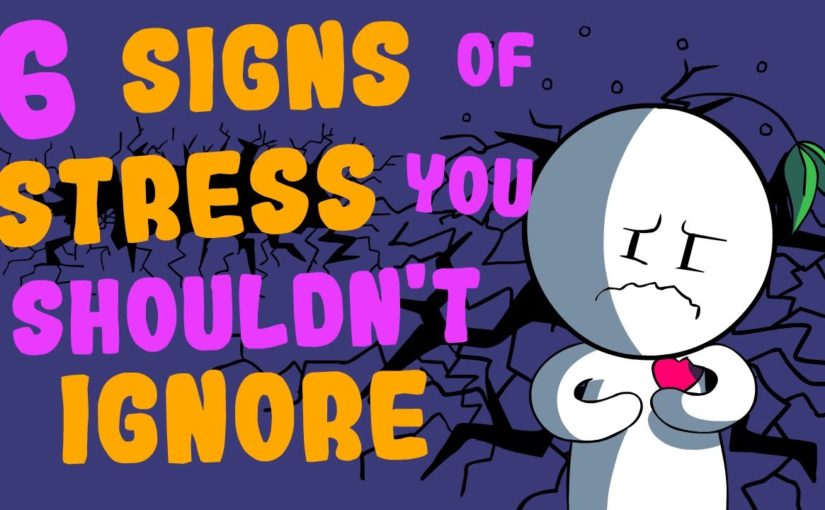
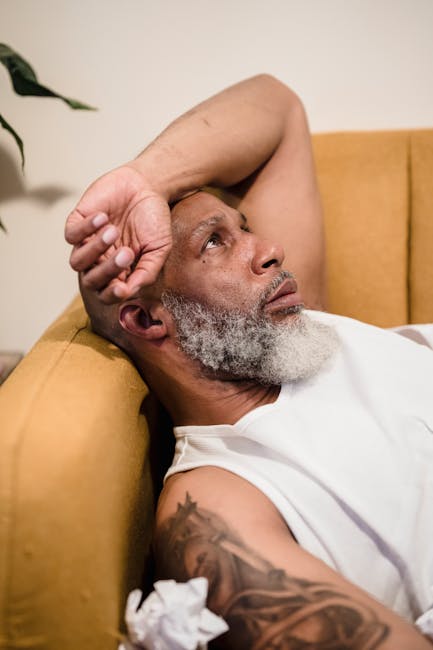 You experience sleep issues and low energy are you having a hard time with sleep lately a study on 2316 people showed that those experiencing more stressful events had a higher risk of insomnia continuously having poor sleep may make you feel sluggish during the day the change in eating habits mentioned before may also contribute to low blood sugar leading to feelings of low energy five deep breathing can become difficult stress and strong emotions can cause the breathing Airway to constrict resulting in symptoms such as shortness of breath and Rapid breathing almost like panting some studies show that acute stress can actually cause an asthma attack or a panic attack and six cravings for substance misuse become stronger like food substances may cause temporary immediate satisfaction in the brain so you feel better however abusing anything new intake can have devastating consequences such as excessively consuming alcohol or nicotine are you craving substances or even unhealthy food more than normal it may be a sign that you’re stressed we can see that all these physical symptoms impact each other impact your mood and impact your behavior if you notice that you’re experiencing several of these symptoms mentioned it may be your body telling you to take a break be sure to take care of yourself and get the rest you need after all you only have one body and all your bodily systems affect one another how do you de-stress let us know in the comments below share this with someone you think might be showing signs of stress as well don’t forget to click the like button and subscribe for more psychology content and as always thanks for watching [Applause] [Music]
You experience sleep issues and low energy are you having a hard time with sleep lately a study on 2316 people showed that those experiencing more stressful events had a higher risk of insomnia continuously having poor sleep may make you feel sluggish during the day the change in eating habits mentioned before may also contribute to low blood sugar leading to feelings of low energy five deep breathing can become difficult stress and strong emotions can cause the breathing Airway to constrict resulting in symptoms such as shortness of breath and Rapid breathing almost like panting some studies show that acute stress can actually cause an asthma attack or a panic attack and six cravings for substance misuse become stronger like food substances may cause temporary immediate satisfaction in the brain so you feel better however abusing anything new intake can have devastating consequences such as excessively consuming alcohol or nicotine are you craving substances or even unhealthy food more than normal it may be a sign that you’re stressed we can see that all these physical symptoms impact each other impact your mood and impact your behavior if you notice that you’re experiencing several of these symptoms mentioned it may be your body telling you to take a break be sure to take care of yourself and get the rest you need after all you only have one body and all your bodily systems affect one another how do you de-stress let us know in the comments below share this with someone you think might be showing signs of stress as well don’t forget to click the like button and subscribe for more psychology content and as always thanks for watching [Applause] [Music]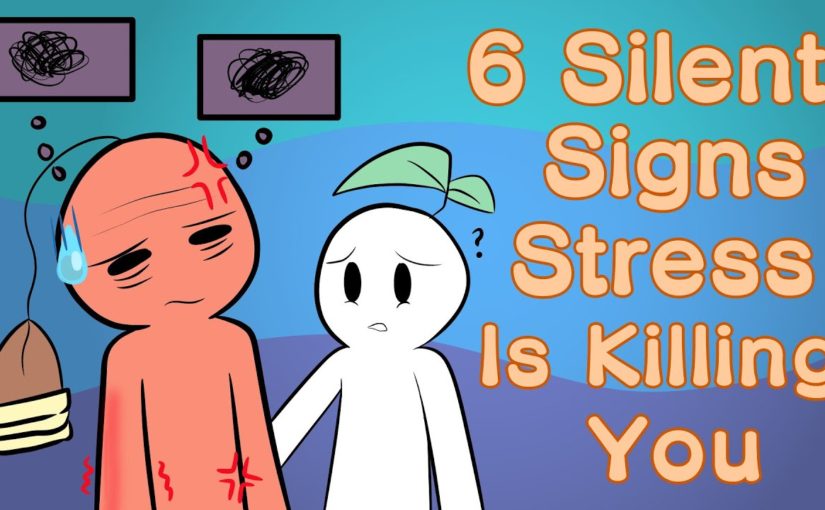
 These problems include bloating,
cramping, and diarrhea, according to Dr. Deborah Rhodes, a Mayo Clinic medicine physician. Additionally, the American
Institute of Stress has reported that your digestive system can be affected by the
increased heart rate from stress, causing
heartburn and acid reflux. Taking an over-the-counter
antiacid, or simple ginger tea, can reduce discomfort. And number six, your body
weight is fluctuating. Are you someone who tends
to check their weight? Have you noticed any unusual changes? Shauna Levine, a clinical
instructor of medicine at Icahn School of Medicine states that the way stress
affects your body weight is by releasing cortisol, and this hormone will
inhibit your body’s ability to process blood sugar while
changing the way your body metabolizes fat,
carbohydrates, and protein. As a result of all these changes, as well as the effects that
stress has on undereating and overeating, you might start to notice unusual weight fluctuations. If you’re undereating,
try snacking on nuts with high protein
content to help you. If you’re overeating,
try to eat more fiber, since this will fill you up. Although these points have
individual treatments, you will eventually have to address the stress causing
all these problems. Stress isn’t all bad, as short bursts of stress
can help you, but you need to try things that can help with long-term stress, such as mindfulness, meditation, or yoga. Learning how to deal with stress through different techniques will help you avoid the emotional and physical
burden that comes with it. Do you relate to any of these signs? Let us know in the comments below. If your stress persists, or you have any concerns
about your symptoms, please see a healthcare professional. Psych2Go is not certified to
provide official treatments or advice, and serious issues
require professional advice. Thanks so much for watching our video. What are the different ways that you like to cope with your stress? What has been the most effective for you? We’d love everyone to share and help each other out in the comments. If you enjoyed it, please consider giving this video a like, and subscribing to our channel to see more content like this. We’ll see you at the next one.
These problems include bloating,
cramping, and diarrhea, according to Dr. Deborah Rhodes, a Mayo Clinic medicine physician. Additionally, the American
Institute of Stress has reported that your digestive system can be affected by the
increased heart rate from stress, causing
heartburn and acid reflux. Taking an over-the-counter
antiacid, or simple ginger tea, can reduce discomfort. And number six, your body
weight is fluctuating. Are you someone who tends
to check their weight? Have you noticed any unusual changes? Shauna Levine, a clinical
instructor of medicine at Icahn School of Medicine states that the way stress
affects your body weight is by releasing cortisol, and this hormone will
inhibit your body’s ability to process blood sugar while
changing the way your body metabolizes fat,
carbohydrates, and protein. As a result of all these changes, as well as the effects that
stress has on undereating and overeating, you might start to notice unusual weight fluctuations. If you’re undereating,
try snacking on nuts with high protein
content to help you. If you’re overeating,
try to eat more fiber, since this will fill you up. Although these points have
individual treatments, you will eventually have to address the stress causing
all these problems. Stress isn’t all bad, as short bursts of stress
can help you, but you need to try things that can help with long-term stress, such as mindfulness, meditation, or yoga. Learning how to deal with stress through different techniques will help you avoid the emotional and physical
burden that comes with it. Do you relate to any of these signs? Let us know in the comments below. If your stress persists, or you have any concerns
about your symptoms, please see a healthcare professional. Psych2Go is not certified to
provide official treatments or advice, and serious issues
require professional advice. Thanks so much for watching our video. What are the different ways that you like to cope with your stress? What has been the most effective for you? We’d love everyone to share and help each other out in the comments. If you enjoyed it, please consider giving this video a like, and subscribing to our channel to see more content like this. We’ll see you at the next one.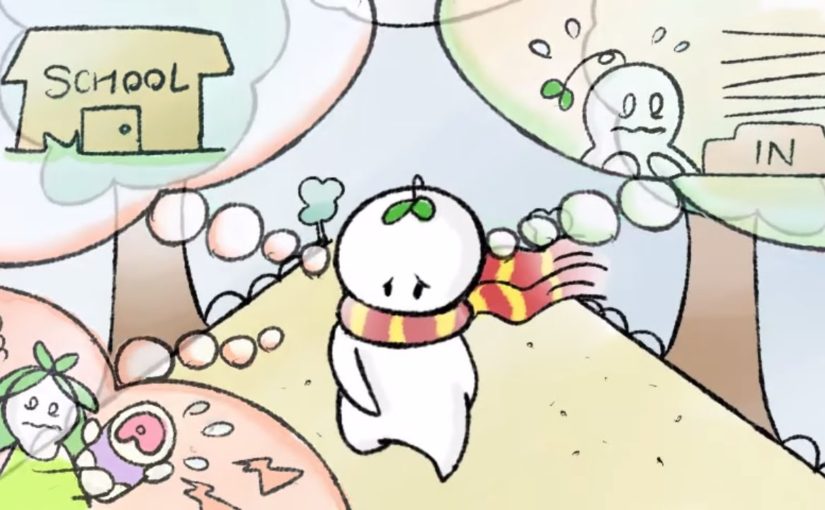
 They might only be able to nod or whisper Four) Panic disorder It becomes a disorder when an individual experiences panic attacks multiple times in their lifetime Panic attacks are intense bursts of fear followed by a range of physical symptoms, these include at least four of the following: Cold sweats, Muscle stiffness or Trembling, Hyperventilation, which is fast, shallow breathing Lightheadedness, Numbness or the Fear of death and/or Insanity The fear afterward of another panic attack. Sometimes actually provokes more panic attacks More often than not, panic attacks are had in combination with other anxiety disorders Therapy along with medications can help in handling panic disorder Five) Agoraphobia Does your local train station seem intimidating? Do you feel faint in a crowded place? Agoraphobia is the fear of public places Anxiety arises because they deem them as too open or dangerous It’s triggered by fears like becoming a victim of crime or of contracting a disease or illness Its sufferers coop themselves up in their homes where they’re comfortable and familiar with their environment Agoraphobe often become over-dependent on other people to compensate for their inability to cope in public Agoraphobia can develop at any age and can be extremely debilitating Exposure therapy works effectively against Agoraphobia in conjunction with medication Six) Specific Phobia These are persistent and extreme fears about a specific object or situation and cause a ton of stress to the sufferer Phobias can be environmental like Acrophobia, the fear of heights and they can be animal-based Or even situational like Taphophobia, the fear of being buried alive Such phobias often arise due to traumatic experiences that cause people to make negative associations with these objects or situations Someone who was clawed in the face by a cat in their childhood might have an avid fear of cats in their adulthood In cases where exposure therapy may not be safe or applicable Cognitive behavioural therapy can be effective in changing a person’s negative association to their feared object or situation Seven) Obsessive-Compulsive Disorder OCD and Post-Traumatic StressDisorder PTSD Yes, OCD and PTSD were categorized by many psychiatrists as disorders to be grouped with the aforementioned anxiety disorders Recently there have been new findings about these disorders that team them both unique enough to be in categories of their own, However, this is not to suggest that OCD and PTSD are any less important to deal with The common thread that group disorders like GAD, S.A.D., panic disorder, and phobias together Is that sufferers of these anxiety disorders experience future-oriented fear? OCD differs, and though there is anxiety felt in the sufferer’s obsession They can find temporary relief in their ritualistic compulsions Unfortunately for OCD sufferers, this means a life of cyclical ritualism that can affect daily living Those suffering from PTSD May suffer anxiety-like symptoms similar to GAD or even panic disorder But PTSD is unique and that its past oriented The sufferer suffers flashbacks that bring them back to the event of their traumatization If you’re diagnosed with anxiety disorder, it’s okay Millions of people around the world understand what it’s like to suffer from an anxiety disorder, so you’re not alone Understand that every single one of these anxiety types is often treatable and manageable Also, if you know someone who may benefit from online counseling we’ve partnered up with Better Help, an affordable online counseling platform that you can utilize They’re constantly striving to improve their services and terms and conditions. The link will be in the description box Did you find this video helpful? If so, remember to share this video with those you think might benefit from it As always, Thanks for watching!
They might only be able to nod or whisper Four) Panic disorder It becomes a disorder when an individual experiences panic attacks multiple times in their lifetime Panic attacks are intense bursts of fear followed by a range of physical symptoms, these include at least four of the following: Cold sweats, Muscle stiffness or Trembling, Hyperventilation, which is fast, shallow breathing Lightheadedness, Numbness or the Fear of death and/or Insanity The fear afterward of another panic attack. Sometimes actually provokes more panic attacks More often than not, panic attacks are had in combination with other anxiety disorders Therapy along with medications can help in handling panic disorder Five) Agoraphobia Does your local train station seem intimidating? Do you feel faint in a crowded place? Agoraphobia is the fear of public places Anxiety arises because they deem them as too open or dangerous It’s triggered by fears like becoming a victim of crime or of contracting a disease or illness Its sufferers coop themselves up in their homes where they’re comfortable and familiar with their environment Agoraphobe often become over-dependent on other people to compensate for their inability to cope in public Agoraphobia can develop at any age and can be extremely debilitating Exposure therapy works effectively against Agoraphobia in conjunction with medication Six) Specific Phobia These are persistent and extreme fears about a specific object or situation and cause a ton of stress to the sufferer Phobias can be environmental like Acrophobia, the fear of heights and they can be animal-based Or even situational like Taphophobia, the fear of being buried alive Such phobias often arise due to traumatic experiences that cause people to make negative associations with these objects or situations Someone who was clawed in the face by a cat in their childhood might have an avid fear of cats in their adulthood In cases where exposure therapy may not be safe or applicable Cognitive behavioural therapy can be effective in changing a person’s negative association to their feared object or situation Seven) Obsessive-Compulsive Disorder OCD and Post-Traumatic StressDisorder PTSD Yes, OCD and PTSD were categorized by many psychiatrists as disorders to be grouped with the aforementioned anxiety disorders Recently there have been new findings about these disorders that team them both unique enough to be in categories of their own, However, this is not to suggest that OCD and PTSD are any less important to deal with The common thread that group disorders like GAD, S.A.D., panic disorder, and phobias together Is that sufferers of these anxiety disorders experience future-oriented fear? OCD differs, and though there is anxiety felt in the sufferer’s obsession They can find temporary relief in their ritualistic compulsions Unfortunately for OCD sufferers, this means a life of cyclical ritualism that can affect daily living Those suffering from PTSD May suffer anxiety-like symptoms similar to GAD or even panic disorder But PTSD is unique and that its past oriented The sufferer suffers flashbacks that bring them back to the event of their traumatization If you’re diagnosed with anxiety disorder, it’s okay Millions of people around the world understand what it’s like to suffer from an anxiety disorder, so you’re not alone Understand that every single one of these anxiety types is often treatable and manageable Also, if you know someone who may benefit from online counseling we’ve partnered up with Better Help, an affordable online counseling platform that you can utilize They’re constantly striving to improve their services and terms and conditions. The link will be in the description box Did you find this video helpful? If so, remember to share this video with those you think might benefit from it As always, Thanks for watching!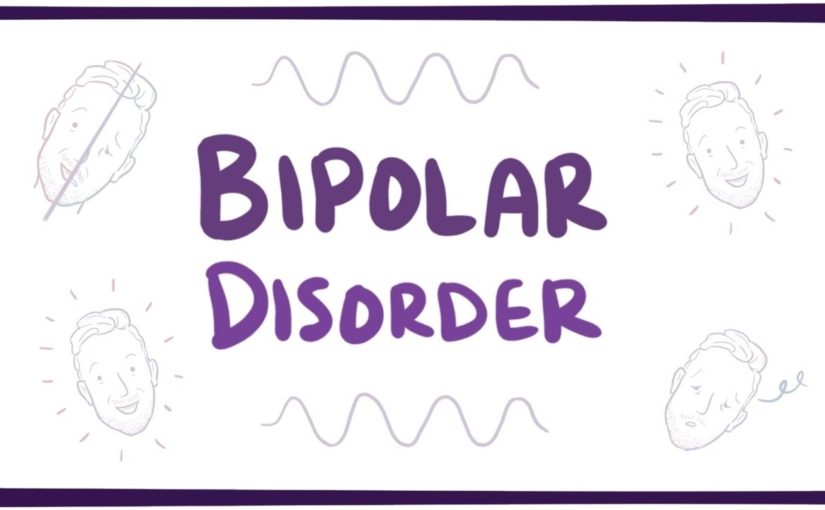
 Sometimes, people with Bipolar disorder can
show other, less common symptoms as well, for example having what is referred to as
mixed episodes—experiencing symptoms of both depression and mania at the same time. Another symptom they might have is rapid cycling,
which describes a situation where a person has 4 or more episodes of depression or mania
within a given year. Like most mental health conditions, the exact
the underlying cause of the bipolar disorder isn’t known, and there is no single “bipolar gene”
identified, but it’s thought that there are genetic and environmental factors that
play a part. For example, one interesting clue is that
people with family members who have bipolar disorder are 10 times more likely to have
it themselves. Another clue is that some drugs and medications
can trigger manic episodes, like selective serotonin reuptake inhibitors (or SSRIs). It’s also worth mentioning that people with
bipolar disorder often have other disorders like anxiety disorders, substance use disorders,
ADHD, and personality disorders as well, making diagnosis and treatment a real challenge. Even though there’s no cure for bipolar
disorder, identifying and treating individuals is important, since there’s a real
danger that the person could harm themselves or commit suicide. One of the oldest treatments is also one of
the most effective treatments, and that’s lithium salts. Lithium acts as a mood stabilizer—smoothing
out the highs and lows they experience. That said, it is much better at treating manic
rather than depressive episodes, and so individuals who take it often have to take other medications
as well, which can be problematic since some antidepressants (like the SSRIs) can trigger
manic episodes in individuals who are predisposed to them. Other treatment options include antipsychotics,
anticonvulsants, and benzodiazepines, but many of these—including lithium—have side
effects that can be severe and lead to non-adherence which can be dangerous for an individual. Now, unlike certain disorders like unipolar
depression, psychological interventions, like talk therapy, or cognitive-behavioral therapy
are not particularly effective in treating the manic episodes of bipolar disorder. Having said that, they can still be very helpful
tools to help individuals with bipolar disorder in general—especially after a manic episode
has ended. They can also help an individual handle stressful
situations that might otherwise lead to a manic episode, thereby helping to prevent a potential
manic episode in the first place. Alright, so super fast recap: bipolar disorder
is a mental disorder characterized by depression, periods of lowered mood, as well as mania,
and periods of heightened mood. Thanks for watching, you can help support
us by donating on Patreon, subscribing to our channel, or telling your friends about
us on social media.
Sometimes, people with Bipolar disorder can
show other, less common symptoms as well, for example having what is referred to as
mixed episodes—experiencing symptoms of both depression and mania at the same time. Another symptom they might have is rapid cycling,
which describes a situation where a person has 4 or more episodes of depression or mania
within a given year. Like most mental health conditions, the exact
the underlying cause of the bipolar disorder isn’t known, and there is no single “bipolar gene”
identified, but it’s thought that there are genetic and environmental factors that
play a part. For example, one interesting clue is that
people with family members who have bipolar disorder are 10 times more likely to have
it themselves. Another clue is that some drugs and medications
can trigger manic episodes, like selective serotonin reuptake inhibitors (or SSRIs). It’s also worth mentioning that people with
bipolar disorder often have other disorders like anxiety disorders, substance use disorders,
ADHD, and personality disorders as well, making diagnosis and treatment a real challenge. Even though there’s no cure for bipolar
disorder, identifying and treating individuals is important, since there’s a real
danger that the person could harm themselves or commit suicide. One of the oldest treatments is also one of
the most effective treatments, and that’s lithium salts. Lithium acts as a mood stabilizer—smoothing
out the highs and lows they experience. That said, it is much better at treating manic
rather than depressive episodes, and so individuals who take it often have to take other medications
as well, which can be problematic since some antidepressants (like the SSRIs) can trigger
manic episodes in individuals who are predisposed to them. Other treatment options include antipsychotics,
anticonvulsants, and benzodiazepines, but many of these—including lithium—have side
effects that can be severe and lead to non-adherence which can be dangerous for an individual. Now, unlike certain disorders like unipolar
depression, psychological interventions, like talk therapy, or cognitive-behavioral therapy
are not particularly effective in treating the manic episodes of bipolar disorder. Having said that, they can still be very helpful
tools to help individuals with bipolar disorder in general—especially after a manic episode
has ended. They can also help an individual handle stressful
situations that might otherwise lead to a manic episode, thereby helping to prevent a potential
manic episode in the first place. Alright, so super fast recap: bipolar disorder
is a mental disorder characterized by depression, periods of lowered mood, as well as mania,
and periods of heightened mood. Thanks for watching, you can help support
us by donating on Patreon, subscribing to our channel, or telling your friends about
us on social media.